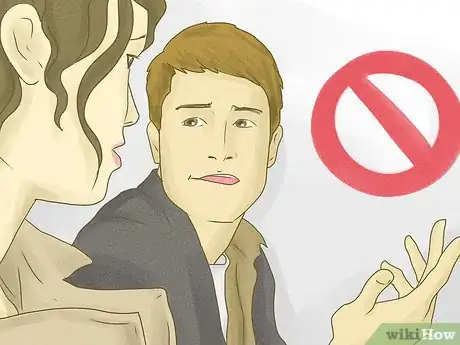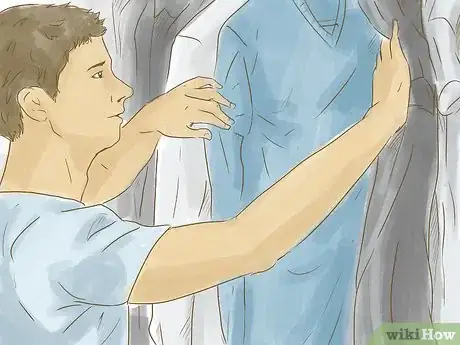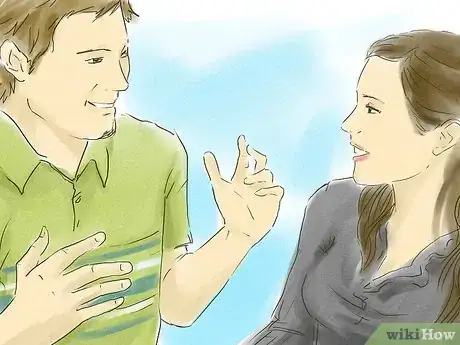This article was co-authored by Maureen Taylor. Maureen Taylor is the CEO and Founder of SNP Communications, a leadership communications company based in the San Francisco Bay Area. She has been helping leaders, founders, and innovators in all sectors hone their messaging and delivery for almost 30 years, and has worked with leaders and teams at Google, Facebook, Airbnb, SAP, Salesforce, and Spotify.
There are 9 references cited in this article, which can be found at the bottom of the page.
wikiHow marks an article as reader-approved once it receives enough positive feedback. In this case, 87% of readers who voted found the article helpful, earning it our reader-approved status.
This article has been viewed 138,712 times.
We've all encountered someone who's the opposite of modest—they go on and on about their accomplishments, they constantly one-up everyone, they have to have the biggest and best of everything. Someone who is modest, on the other hand, doesn't feel the need to show off to others, even if they do have a lot to brag about. The good news is that anyone can become more modest. It just comes down to cultivating the right attitude and being more mindful of how you present yourself and interact with others. If you're not sure where to get started, don't worry—this article will walk you through some simple changes you can make to start becoming a more modest person.
Steps
Cultivating a Modest Attitude
-
1Have a healthy, realistic impression of yourself. Being modest begins with how you see yourself and your place in the world. By being aware of your own strengths and weaknesses, you can avoid the pitfalls of arrogance and start to live more modestly.[1] [2]
- Try to see yourself the way others see you by asking your closest friends how they perceive you. Ask about both the good and the bad, and let your friends know you'd like a fair and honest assessment.
- Acknowledge your good qualities and your positive accomplishments, but don't let these things inflate your ego or define your life.
-
2Seek out advice and constructive criticism. A modest person is defined by his or her humility. If you're trying to live more modestly, you should accept the fact that you do not know everything about yourself, and that you may need advice and guidance from others.[3]
- Accept that you may be wrong from time to time. Remember that there's nothing wrong with this; no one is perfect, and no one can be right all of the time.[4]
- Don't interrupt when someone is criticizing you or giving you advice. You may be tempted to defend yourself, but by listening actively you'll learn a great deal about yourself.
- Don't dismiss the criticism others offer you, but don't accept or believe it all at face value. Ask other people who know you if they've noticed similar patterns of behavior, and assess your need to improve while keeping your ego in check.
Advertisement -
3Resist the urge to brag about yourself. Another facet of humility is personal restraint. Modest people do not brag about their wealth or accomplishments, and they don't let these things define them. That doesn't necessarily mean that you should hide anything about yourself; it simply means that you shouldn't boast about anything.[5]
- Telling a new acquaintance in conversation about something significant that you've done isn't necessarily bragging if it's relevant to the conversation.
- Telling someone about your accomplishments repeatedly, or reminding someone who already knows about them, could be seen as bragging.
-
4Accept compliments without an ego. A modest person should not let compliments get to his or her head. You can accept a compliment graciously, but you should not let it feed into your ego or make you think that you're better than others.[6] [7]
- Recognize that everyone has strengths and weaknesses, but don't let those qualities define you or anyone else.
- If someone compliments one of your strengths, you can practice being modest by thanking that person and complimenting them on one of their strengths.
-
5Strive for selflessness. A modest person puts the needs of others ahead of his or her own needs. That doesn't mean forcing yourself to suffer; it simply means being considerate of others and fostering a desire to help others in some way.[8]
- Be kind to others and think about whether their needs are being met.
- You may find that it is ultimately more important and more rewarding to elevate others than to try to elevate yourself.
Living a Modest Lifestyle
-
1Live within your means. The key to living a modest lifestyle is living within your means. That means avoiding extravagance and settling for the basics. You don't have to deprive yourself to live modestly - you just have to value function and practicality over luxurious status symbols.[9]
- Drive a car that is safe, comfortable, and works well. Don't choose a car for its flashiness or status value.
- Buy or rent a home that is sturdy, comfortable, and in a safe neighborhood. If you only need two bedrooms then don't rent or buy a place with three bedrooms.
- Find out the average cost to purchase a home in your area and try to work within that price range (if it fits your budget).
-
2Buy used or discount items whenever possible. One easy way to live a more modest lifestyle is to buy items that are used or discounted instead of paying full price. This can help you save on the basics when you're at the store. Look for items on sale, discount, or clearance when you're at a retail store. You can also check thrift stores for gently-used items available at a fraction of the cost of new items.
- Gently-used items are often in like-new condition. You can find these at thrift stores, consignment shops, and pawn shops.
- Many clothing stores put out-of-season garments on clearance. These can typically be purchased at a very low cost.
- Check stores that are going out of business, as they often have good deals to move products out the door.
-
3Try not to worry about whether others are impressed. Living modestly and humbly means emphasizing your values ahead of the opinions of others. Don't trouble yourself wondering whether others are impressed with you or with your possessions. Instead, focus on living a meaningful and upstanding life.[10]
Dressing and Behaving More Modestly
-
1Wear clothing that is not revealing. Many religious and cultural institutions encourage people to dress modestly. The goal of dressing modestly is to provide a good, morally-sound influence to the people you interact with.[11]
- Generally speaking, modest clothing is any article of clothing that is not sexually suggestive and does not show off the body.
- This means avoiding any clothing that reveals too much skin, and it may also entail avoiding clothes that are tight-fitting.
-
2Avoid extremes in appearance. Modest dress may also include a general avoidance of extremes, depending on one's culture. This may mean being neatly groomed and manicured, conforming to prescribed fashion trends, and abstaining from getting tattoos or piercings.[12]
- Someone who wants to live modestly and also wants to have pierced ears may find that a single pair of plain earrings will accommodate both desires.
-
3Use language that is positive and uplifting. Modest speech means refraining from vulgarity or negative language. Instead, a modest speaker should strive to be a positive role model for others and should try to make others feel happy.[13]
- Don't use swear words.
- If you're trying to be modest for spiritual purposes you should also avoid blasphemous language.
- Ask yourself whether the things you say would inspire and uplift others, or them feel uncomfortable or upset.
Expert Q&A
-
QuestionCan you be modest and confident at the same time?
 Maureen TaylorMaureen Taylor is the CEO and Founder of SNP Communications, a leadership communications company based in the San Francisco Bay Area. She has been helping leaders, founders, and innovators in all sectors hone their messaging and delivery for almost 30 years, and has worked with leaders and teams at Google, Facebook, Airbnb, SAP, Salesforce, and Spotify.
Maureen TaylorMaureen Taylor is the CEO and Founder of SNP Communications, a leadership communications company based in the San Francisco Bay Area. She has been helping leaders, founders, and innovators in all sectors hone their messaging and delivery for almost 30 years, and has worked with leaders and teams at Google, Facebook, Airbnb, SAP, Salesforce, and Spotify.
Communications Coach Yes, you can. To be able to do that, you must strike a balance in a way that your confidence replaces your insecurities. Try to learn how to receive compliments and to acknowledge your mistakes, fluctuating back and forth between legitimate confidence and humility about what you need to learn more.
Yes, you can. To be able to do that, you must strike a balance in a way that your confidence replaces your insecurities. Try to learn how to receive compliments and to acknowledge your mistakes, fluctuating back and forth between legitimate confidence and humility about what you need to learn more.
References
- ↑ https://www.psychologytoday.com/blog/incompetence/201201/foolish-arrogance?collection=84621
- ↑ Maureen Taylor. Communications Coach. Expert Interview. 24 March 2021.
- ↑ https://www.psychologytoday.com/blog/incompetence/201201/foolish-arrogance?collection=84621
- ↑ https://www.psychologytoday.com/blog/owning-pink/201405/10-tips-receiving-criticism-grace
- ↑ https://www.psychologytoday.com/blog/insight/201009/the-proper-way-brag
- ↑ https://www.psychologytoday.com/articles/201105/maybe-its-just-me-how-be-modest
- ↑ Maureen Taylor. Communications Coach. Expert Interview. 24 March 2021.
- ↑ https://www.moore.edu.au/resources/thinktank/23-07-2013/8-ways-to-become-more-humble
- ↑ https://brightspotcdn.byu.edu/ae/d3/dc560e59402aaed80297dcf506d9/fundamentals-of-family-finance-basic-principles-2e-guts.pdf


















-Step-14.webp)






-Step-26-Version-2.webp)















































